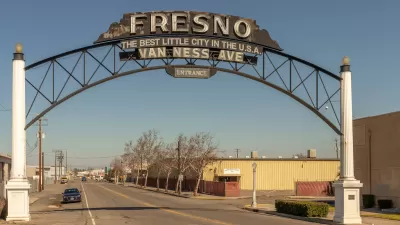The High Speed Rail Authority received a key approval from the Federal Railroad Administration to begin construction in California's Central Valley, specifically the 60-mile Merced to Fresno stretch. The remaining hurdles are several lawsuits.
Construction will begin on the 60-mile stretch between Fresno and Merced, known technically as the Initial Construction Segment. It will be funded with $2.6 billion in Prop 1A, 2008 state High Speed Rail (HSR) bonds and $3.2 billion from the federal government, a substantial part of which comes from stimulus funds rejected by the governors of Ohio, Wisconsin and Florida who opposed the high speed rail grants that their predecessors had successfully applied for.
Tim Sheehan of the Fresno Bee reports on the landmark approval.
"Backers of the project hailed the decision as historic for the development of the first high-speed train project in the nation and the start of construction in the central San Joaquin Valley. 'With the federal record of decision, we are now poised to move forward and break ground next year,' said Jeff Morales, the CEO of the High Speed Rail Authority (HSRA)..
"But the specter of lawsuits continues to hang over the project. Several have been filed against the rail authority in hopes of stalling or stopping work on the Merced-Fresno section.
The decision comes despite recent pleas from critics asking the federal authority to withhold approval based on concerns over "environmental justice" in the environmental review process, potentially in violation of the National Environmental Policy Act."
Also writing on the approval is Juliet Williams of the Associated Press who reports that the plan is now in compliance with "dozens of federal regulations, including the:
- Endangered Species Act
- Fish and Wildlife regulations
- National Historic Preservation Act"
Many of the lawsuits are coming from Central Valley farmers who oppose the project.
"We're not seeking necessarily to stop the project entirely, but we do think the project should be stopped until some of these environmental issues, and their severity, are addressed," said Anja Raudabaugh, executive director of the Madera County Farm Bureau.
Thanks to Streetsblog San Francisco
FULL STORY: Federal OK for high-speed rail

Study: Maui’s Plan to Convert Vacation Rentals to Long-Term Housing Could Cause Nearly $1 Billion Economic Loss
The plan would reduce visitor accommodation by 25,% resulting in 1,900 jobs lost.

Alabama: Trump Terminates Settlements for Black Communities Harmed By Raw Sewage
Trump deemed the landmark civil rights agreement “illegal DEI and environmental justice policy.”

North Texas Transit Leaders Tout Benefits of TOD for Growing Region
At a summit focused on transit-oriented development, policymakers discussed how North Texas’ expanded light rail system can serve as a tool for economic growth.

Paris Bike Boom Leads to Steep Drop in Air Pollution
The French city’s air quality has improved dramatically in the past 20 years, coinciding with a growth in cycling.

Why Housing Costs More to Build in California Than in Texas
Hard costs like labor and materials combined with ‘soft’ costs such as permitting make building in the San Francisco Bay Area almost three times as costly as in Texas cities.

San Diego County Sees a Rise in Urban Coyotes
San Diego County experiences a rise in urban coyotes, as sightings become prevalent throughout its urban neighbourhoods and surrounding areas.
Urban Design for Planners 1: Software Tools
This six-course series explores essential urban design concepts using open source software and equips planners with the tools they need to participate fully in the urban design process.
Planning for Universal Design
Learn the tools for implementing Universal Design in planning regulations.
Smith Gee Studio
Alamo Area Metropolitan Planning Organization
City of Santa Clarita
Institute for Housing and Urban Development Studies (IHS)
City of Grandview
Harvard GSD Executive Education
Toledo-Lucas County Plan Commissions
Salt Lake City
NYU Wagner Graduate School of Public Service



























